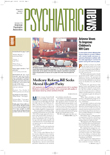It is no coincidence that APA’s Academic Consortium meets when Congress is deciding how much funding to give key federal agencies that conduct psychiatric and substance abuse research. Approximately 60 psychiatrists, neuroscientists, researchers, and patient advocates went to Capitol Hill last month as Congress was deciding on funding levels to convey the message that medical research improves people’s lives.
The group pushed for a 16.5 percent increase in the budget of the National Institutes of Health to meet the goal of doubling the NIH budget between Fiscal Years (FY) 1998 and 2003. APA is a member of the Ad Hoc Group for Medical Research Funding, which has advocated for doubling the NIH budget since 1998. The NIH is the parent agency of the National Institute of Mental Health (NIMH) and the agencies dealing with alcohol and substance abuse.
“Members of Congress were very receptive to our message and told us they appreciated what the NIH has accomplished. They believe the federal financial investment has been well spent,” cochair and consortium founder Lewis Judd, M.D., told Psychiatric News. Judd chairs the psychiatry department at the University of California at San Diego and is a former director of NIMH.
APA Medical Director Steven Mirin, M.D., told the group prior to its Hill visits, “We are setting the gold standard for advocacy efforts on Capitol Hill by bringing researchers and clinicians together with patients and family members. The more than 100 face-to-face meetings you have scheduled with members of Congress or their legislative staff can have a tremendous impact on the course of both budget and policy decisions.”
Consortium members were delighted when the Senate approved an increase of $3.4 billion for Fiscal 2002 NIH budget last month. The additional funding, if approved in conference with the House of Representatives, would bring the total NIH budget for FY 2002 to $23.7 billion. This represents a 16.5 percent increase over FY 2001 and exceeds the 13.5 percent increase requested by President George W. Bush, according to Lizbet Boroughs, an associate director in the APA Division of Government Relations.
The House, however, passed the President’s proposed FY 2002 NIH budget increase of $2.8 billion in March, and the differences with the Senate budget resolution will be ironed out in a joint conference committee that is expected to issue its report this month.
The Ad Hoc Group for Medical Research Funding also proposed a 16.5 percent increase in FY 2002 funding for NIMH, National Institute on Drug Abuse, and National Institute on Alcoholism and Alcohol Abuse, according to Boroughs.
Senators Arlen Specter (R-Pa.) and Tom Harkin (D-Iowa) offered the $3.4 billion NIH budget increase as an amendment to the FY 2002 federal budget resolution that passed the Senate in March. Specter is chair and Harkin is the ranking minority member of the Senate Appropriations Committee for Labor and Health and Human Services.
Consortium cochair David Kupfer, M.D., told Psychiatric News, “The passage of the Senate budget resolution, which was a key advocacy objective of the Academic Consortium, has been realized. The 16.5 percent increase will enable NIH to stay on track for the bipartisan effort to double the NIH budget over five years. Without that increase, it was unlikely the doubling would occur.” Kupfer chairs the department of psychiatry at Western Psychiatric Institute and Clinic at the University of Pittsburgh.
A new focus for the Academic Consortium this year was the Veterans Affairs research budget. Judd commented that 25 percent of veterans have neuropsychiatric disorders, yet psychiatric research spending represents only about 12 percent of the VA’s total medical and prosthetic research budget.
APA’s advocacy strategy is to increase the overall VA medical and prosthetic research budget and “make sure psychiatric research gets a proportionate share,” says Judd. The ultimate goal is to double the VA medical and prosthetic research budget by FY 2003.
President Bush proposed that $51 billion be spent on the VA in FY 2002, with $355 million for medical and prosthetic research. APA wants $395 million spent on medical and prosthetic research.
APA recommends that $50 million of that $395 million be spent to establish two new Mental Illness Research, Education, and Clinical Centers (MIRECCs). “The MIRECCS generate new knowledge about the causes and treatment of mental illnesses and improve clinical services for individuals suffering from mental illnesses,” said Boroughs.
APA also recommended that Congress designate $100 million annually from the VA budget to help seriously mentally ill veterans, said Boroughs.
Lastly, APA advocates that the VA “reinvest savings from closing inpatient mental health programs to develop an outpatient continuum of care including case management, psychosocial rehabilitation, housing alternatives, and other support services for severely and chronically mentally ill veterans,” Boroughs noted.
Judd pointed out that “four distinguished directors of VA MIRECCS attended this year’s Academic Consortium and met with key members of the Housing and Urban Development (HUD) and VA appropriations committee. We hope that all eight MIRECC directors will attend next year’s academic consortium.”—C.L. ▪
